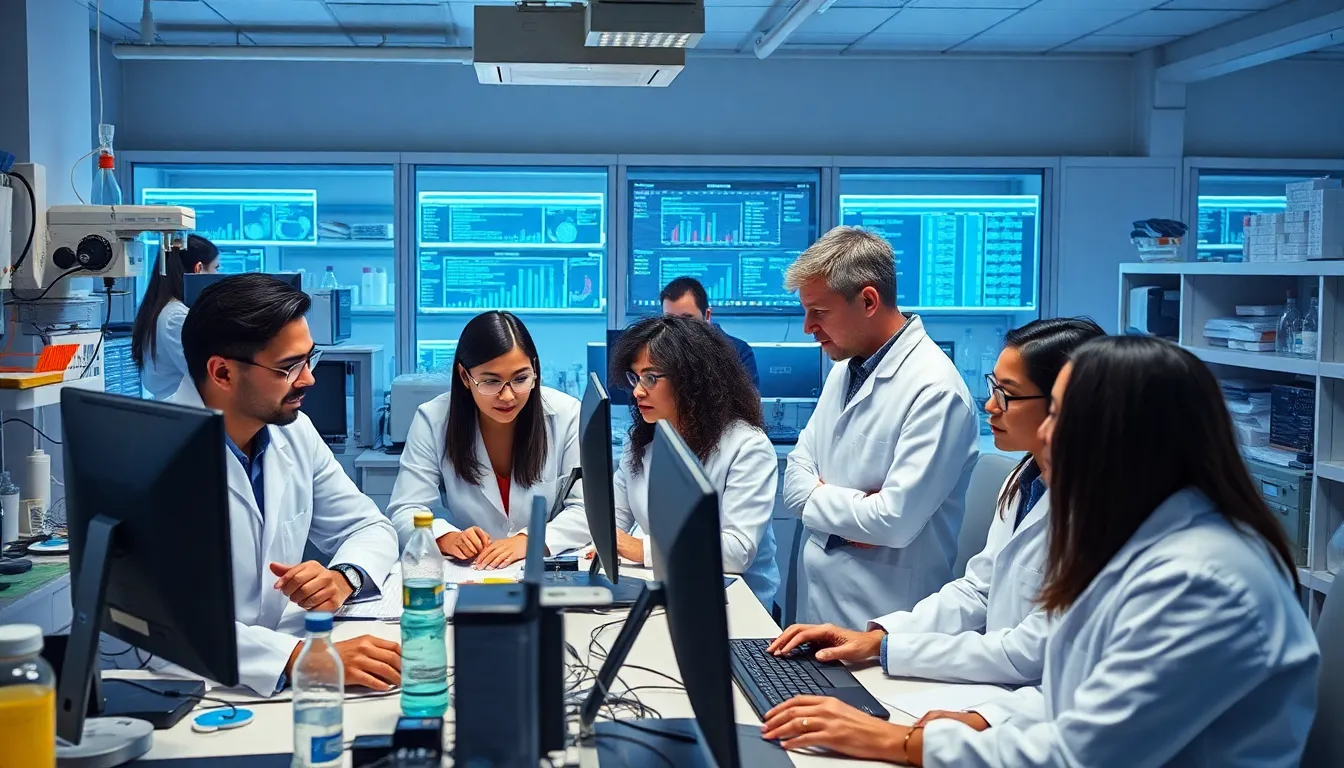Table of Contents
ToggleIn a world where science fiction meets reality, AI biotech companies are rewriting the rules of medicine and agriculture. Imagine a lab where robots crunch data faster than a caffeine-fueled intern and algorithms discover new drugs while you sip your morning coffee. It’s not just a dream; it’s happening right now, and the future looks brighter than a lab full of glowing petri dishes.
Overview of AI Biotech Companies
AI biotech companies are at the forefront of scientific innovation. These organizations integrate artificial intelligence with biotechnology to streamline drug discovery, enhance agricultural productivity, and improve patient outcomes. By harnessing vast amounts of data, they create predictive models that identify potential treatments and optimize crop yields.
Several key players operate within this space. Ginkgo Bioworks focuses on developing custom microbes for applications in various industries, including healthcare and agriculture. Another example, Tempus, utilizes AI to analyze clinical and molecular data, aiming to improve cancer care and patient treatment plans.
AI also transforms traditional research methods. Algorithms expedite the analysis of biological data, uncover relationships that would typically go unnoticed, and reduce the time needed for experimentation. In agriculture, AI tools help monitor crop health, predict weather impacts, and enhance resource management, leading to sustainable practices.
Investment in AI biotech is on the rise. The global market is projected to grow significantly, with estimates reaching over $30 billion by 2025. Companies leverage this funding to expand research initiatives and bring innovative solutions to market.
Collaborations between tech firms and biotech startups drive progress. Partnerships allow for shared expertise and resources, fostering an environment conducive to breakthroughs. Such collaborations often lead to novel therapies and innovative agricultural techniques.
Ultimately, AI biotech companies are revolutionizing multiple sectors. Their ability to merge technology and biology creates opportunities for advancements that promise to reshape the future of health and agriculture, making substantial contributions to society.
Key Players in the Industry

AI biotech companies play a crucial role in the advancement of healthcare and agriculture, with a mix of established giants and emerging startups shaping the landscape.
Established Giants
Companies like Ginkgo Bioworks lead the industry by specializing in synthetic biology. They develop custom microbes for various applications, enhancing efficiency in biotechnology. Tempus is another prominent name, focusing on data-driven cancer care solutions. This firm utilizes AI to analyze clinical and molecular data, improving treatment strategies for patients. Established firms benefit from extensive resources, enabling them to invest heavily in research and development. Such investments allow them to maintain competitive advantages in the rapidly evolving market.
Emerging Startups
Emerging players bring fresh ideas to AI biotech, often focused on niche applications. One example is Zymergen, which combines machine learning with microbial genetics to produce novel materials. Such startups embrace innovation and agility, frequently adapting to changes in technology and consumer demands. Another notable newcomer is Brightseed, which uses AI to explore plant compounds for human health benefits. These startups often attract venture capital funding, propelling their growth and accelerating breakthroughs. By offering unique solutions, they complement the offerings of established giants and contribute to the dynamic nature of the industry.
Technologies Driving AI in Biotechnology
Artificial intelligence significantly advances biotechnology through various technologies. Two primary areas include machine learning applications and genomic data analysis.
Machine Learning Applications
Machine learning enables biotech companies to analyze complex datasets rapidly. Algorithms identify patterns in research data, optimizing the drug discovery process. Companies implement machine learning for predictive modeling, enhancing accuracy in treatment development. Predictive analytics also aids in anticipating patient responses to therapies. These applications streamline workflows, reducing time spent on clinical trials. Key players utilize these technologies to differentiate themselves in a competitive market, increasing their chances of success.
Genomic Data Analysis
Genomic data analysis harnesses AI to interpret vast amounts of genetic information. Sequencing technologies generate massive datasets, and AI tools process these efficiently. By analyzing genetic variations, companies can identify potential disease markers, improving diagnostics. Customized treatments arise from understanding individual genetic profiles, leading to targeted therapies. This technology’s capacity to analyze genomic data rapidly accelerates research timelines and reduces costs. Partnerships with research institutions enhance these efforts, fostering collaborative discoveries in personalized medicine.
Impact of AI on Drug Discovery
AI significantly accelerates drug discovery, changing how researchers develop new treatments. By utilizing machine learning, companies analyze biological data more efficiently, which shortens timelines for identifying viable drug candidates. For instance, predictive models can now anticipate how compounds interact with biological systems, assisting in the design of effective therapies.
Machine learning tools not only enhance data analysis but also refine the overall discovery process. Companies leverage these tools to sift through extensive datasets, identifying patterns and correlations that traditional methods may overlook. As a result, candidates that may have taken years to identify now surface in months.
In addition to machine learning, genomic data analysis showcases AI’s profound influence on drug development. Algorithms interpret vast genetic datasets, identifying potential biomarkers for diseases. Customized treatments increasingly emerge from this analysis, aligning medical interventions with individual patient profiles.
Collaboration among various entities, including biotech firms and research institutions, enhances these innovations. Such partnerships facilitate knowledge sharing and resource pooling, driving progress in precision medicine. As a result, breakthrough therapies often follow quicker development pathways.
The financial landscape supports this progress, with investments in AI biotech surpassing projections. The global market for these technologies is set to exceed $30 billion by 2025. Such growth enables companies to fund extensive research initiatives and clinical trials, expanding their capabilities in drug discovery.
Established leaders like Tempus and Ginkgo Bioworks exemplify this trend by utilizing resources to refine their approaches to data-driven therapies. Emerging startups, on the other hand, continue to introduce unique concepts, often in niche markets. Both player types contribute to a robust ecosystem that fosters continuous advancements in healthcare.
Challenges Faced by AI Biotech Companies
AI biotech companies encounter several challenges that can hinder their growth and innovation. Data privacy stands as a critical concern, especially when dealing with sensitive genetic information. Compliance with regulations requires constant attention, as regulations like HIPAA govern how data can be used and shared.
Funding represents another major challenge for these companies. While investment is rising, securing sufficient capital for research and development often proves difficult, particularly for startups competing against established firms. Balancing innovation with financial sustainability becomes essential for long-term success.
Talent acquisition poses additional hurdles. AI biotech companies need specialized skills in both biotechnology and data science. Finding qualified professionals who possess expertise in these intertwined fields can be competitive, creating a talent gap that companies must address.
Integration of AI systems within existing biotechnology processes also presents complexity. Many companies struggle to implement AI technologies effectively, often encountering resistance to change from traditional practices. Streamlining workflows and fostering a culture that embraces technological advancements is necessary for successful integration.
Ethical concerns regarding AI’s role in decision-making further complicate matters. AI-driven insights can lead to biases if not carefully monitored. Companies must address these ethical dilemmas to ensure fairness and transparency in their applications.
Finally, intellectual property (IP) issues can arise as companies navigate the rapidly evolving landscape of AI and biotechnology. Protecting innovations while fostering collaboration presents a unique challenge. Establishing clear IP strategies is vital for maximizing competitive advantage in this sector.
Future Trends in AI Biotech
AI biotech is set to experience significant advancements, especially in drug discovery and personalized medicine. Machine learning’s role will grow; it’s crucial for streamlining complex data analysis, thereby reducing the time required for clinical trials. Innovations in data interpretation promise to lead to tailored treatments based on genetic profiles.
Investments in AI biotech continue to rise, creating an environment ripe for breakthroughs. The global market is projected to surpass $30 billion by 2025, indicating a robust financial backing for research initiatives. Established companies, including Tempus and Ginkgo Bioworks, will likely benefit most from this influx of capital, while emerging startups target niche areas, encouraging diversity in the industry.
Collaborative efforts between technology firms and biotech companies will drive innovation further. Partnerships will enhance capabilities in predictive modeling, allowing organizations to develop more effective therapies in shorter timeframes. As AI tools evolve, their integration into agricultural solutions will enhance crop resilience and yield forecasts.
Ethical implications surrounding AI use must also receive attention. Transparency in AI decision-making processes is essential to maintain public trust, particularly regarding sensitive genetic data. Addressing these ethical concerns will foster a balanced approach to innovation.
Data privacy regulations, like HIPAA, will continue to shape operational frameworks for AI biotech companies. Ensuring compliance will remain a priority that necessitates ongoing investment in robust security measures. Furthermore, the need for specialized talent in biotechnology and data science will drive shifts in recruitment strategies.
Overall, the landscape of AI biotech grows complex yet promising. With ongoing advancements, the future holds the potential for unprecedented developments in health and agriculture.
AI biotech companies are redefining the boundaries of science and technology. Their innovative approaches are not only enhancing drug discovery but also revolutionizing agricultural practices. As these companies continue to push the envelope, they face challenges that require strategic navigation, particularly in data privacy and talent acquisition.
The future looks bright for AI in biotechnology. With increasing investments and collaborative efforts, breakthroughs in personalized medicine and crop optimization are on the horizon. The dynamic interplay between established firms and emerging startups will drive this evolution, ensuring that advancements in health and agriculture remain at the forefront of scientific progress.







